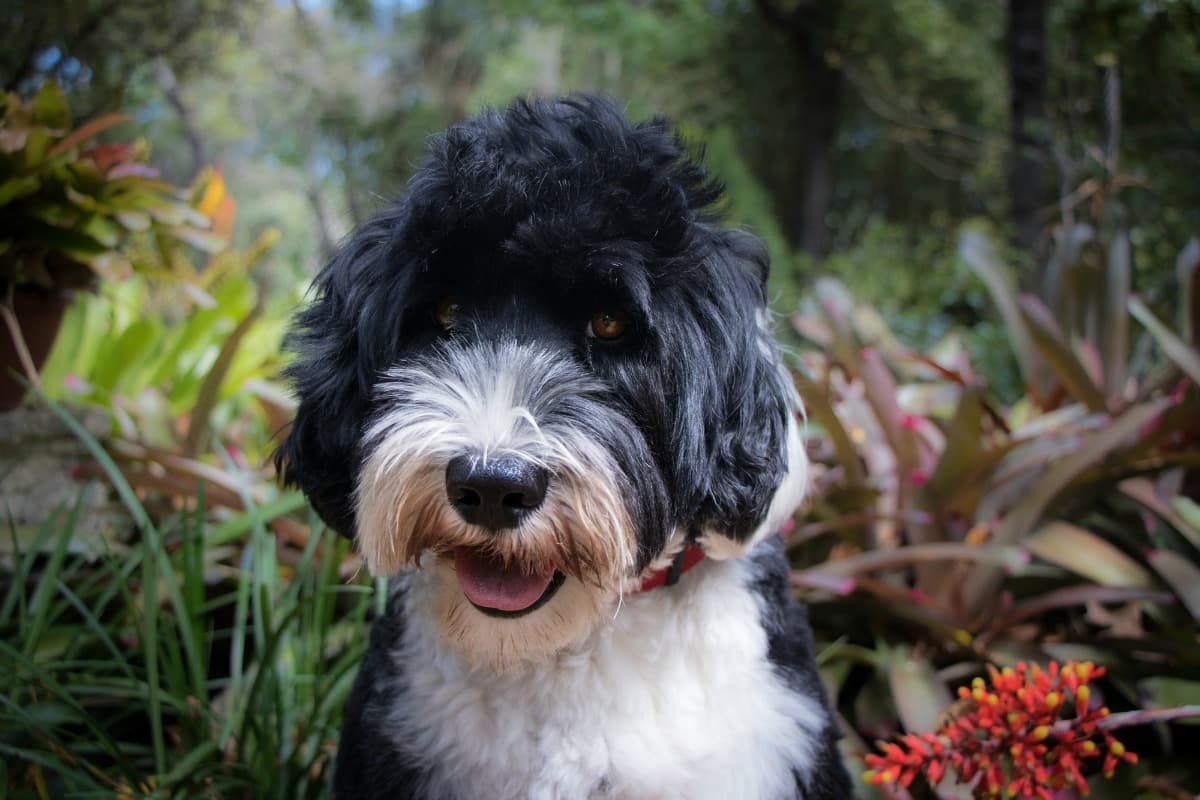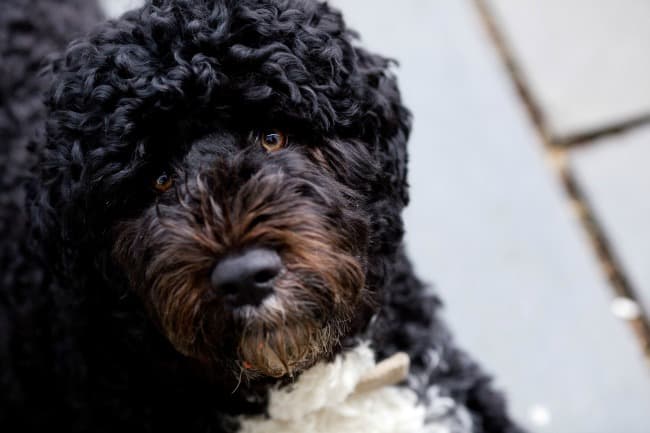FYI: If you buy something through a link on this site I may earn a commission - at NO extra cost to you.
All About Portuguese Water Dogs
What do you know about Portuguese Water Dogs (sometimes incorrectly spelled 'Portugese Water Dog) - apart from the fact that it's the Obamas' chosen breed?
If you're answer was "not much", don't worry, you're not alone!
This
breed doesn't enjoy the popularity of the more well-known breeds such
as the Labrador Retriever, Yorkshire Terrier or Poodle (although is does
bear a strong resemblance to, and probably some ancestors with, the
Poodle).
Of course, now that a Portuguese Water Dog puppy has been a resident of the White House, that could all change.
First seen in the US in the late 1950's, this breed was accepted into the AKC stud books (in the Working Breeds category) in 1983, and although still considered an endangered breed (due to the small gene pool), its' popularity and numbers have continued to increase since then.

Breed Information
Todays' Portuguese Water Dogs ancestors were hard working canines who had an important role in the Portuguese fishing industry.
Known in their native land as Cao de Agua (literally meaning 'dog of the water'), they were used to herd fish, retrieve lines and tackle, carry messages from one boat to another, or from ship to shore, and guard the boat whenever necessary.

Obviously, these dogs needed to be strong,
robust, intelligent, highly trainable and courageous - traits that are
still found in the breed today.
Combine these personality traits with an outgoing, happy disposition, tons of energy and a good dose of loyalty/devotion to family, and you have a dog that can make an ideal family pet.
However, this isn't a dog for everyone. The Portuguese Water Dog needs a job to do, plenty of vigorous exercise, obedience training and regular grooming if it is to be happy and healthy.
Like many working breeds, although it the breed is generally temperamentally sound, it can suffer from anxiety and behavioral issues if there isn't enough exercise and stimulation in it's daily life.
An active person/family, who has room for their dog to run and play is the best sort of home for one of these bright and bouncy dogs. Of course, as their name and history suggests, living near (or frequent visits to) a large body of water makes any member of this breed, who is a competent swimmer, a very happy little fella!
Adults can grow to anywhere between 17 and 23 inches in height, and weigh between 35 and 60lbs. Females are usually smaller and lighter than males, but both sexes should be solidly built and muscular.
Accepted colors are black, white and brown, or a combination of those. The single layer coat is either curly or wavy, and as it tends to be low shedding, this breed may be seen as hypoallergenic and is less likely to trigger symptoms in people with allergies.
Caring For Portuguese Water Dogs
This breed is generally good with children and other pets, and it's fun-loving and affectionate nature makes it a wonderful pet.

But....
a Portuguese Water Dog puppy isn't a lap-dog, and in spite of it's
adorable (and very 'teddy bear-ish') looks, it can be a very 'mouthy'
breed, meaning it may nip more than others, especially when teething.
A PWD's intelligence can be a 'double-edged sword', as they can be strong-willed and may challenge the authority of an owner who is inconsistent or timid. This is not done in an aggressive way, it's just that a smart pup, who hasn't been trained consistently or adequately, may simply decide that it knows best!
This breed usually bonds very closely with it's owner or family, and loves nothing better than to be right by their side. They don't like to be left alone for long periods and thrive when treated as an integral part of the family unit.
Early, and continued, socialization and obedience training are essential. Enrolling your pup in a good dog obedience school just as soon as he's fully vaccinated is recommended.
Because of it's fairly long, wavy or curly coat, your pup will need regular grooming. Luckily a daily (or every other day) combing and brushing is usually enough to keep him looking 'spiffy', and prevent tangles and matts. Regular trimming or clipping is also a good idea.
A Portuguese Water Dogs' coat tends is thick, and tends to repel water, so when you're bathing your pup take extra care to wet him thoroughly and also to rinse out all the shampoo/conditioner really well. They are pretty much wash 'n wear in all other respects.
Choose a high quality puppy food for your puppy. As an active and fast-growing breed, these puppies need a good source of nutrition if they are to grow up healthy and strong.
This breed is known to be a very vigorous 'chewer', and you'll need to have plenty of sturdy chew toys handy to keep your little guy out of trouble (and protect your belongings!).
Check out my Indestructible Dog Toys page for a good selection of some of the best chew toys around, and learn how to handle the chewing stage on my Puppy Chewing page.
Check out my Portuguese Dog Names page to find the perfect name for your pup!
This chewing behavior may extend to to nipping/biting and mouthing on people and this breed is definitely one of the mouthy ones.
Consistent correction is needed from day one to make sure that this behavior doesn't become a habit.
You can find all lots of tips and advice on dealing with this behavior on my Puppy Biting page.
Although all puppies nip to some extent, it's definitely something you want to discourage early on... before those little teeth are big enough to REALLY hurt.
Keeping Your Portuguese Water Dog Healthy
Although it's overall a healthy and robust dog, like any other breed these dogs have their own set of potential health issues.

These include
Addisons' Disease, Irritable Bowel Syndrome,
and an inheritable form of hair loss called Follicular Dysplasia. A
less serious issue your pup may experience are ingrowing eyelashes
(called distichia). This is not unusual in long/curly coated breeds.
The best way to make sure that you have a healthy puppy is to buy from a reputable breeder, preferably one who is a member of the Portuguese Water Dog Club of America.
The parents of any puppy you buy should have been tested for certain hereditary or genetic conditions including those such as Hip Dysplasia, GM1 Storage Disease, PRA (Progressive Retinal Atrophy), and Juvenile Dilated Cardiomyopathy.
It's also important to buy a puppy whose parents you have seen and interacted with, from a breeder who is knowledgeable and provides a health contract/guarantee.
If a breeder asks you lots of questions, that's a good sign! It means that the person you're planning on buying your puppy from really cares about her dogs and puppies.
When a breed becomes suddenly popular (as could well happen with this breed due to the Obamas' ownership), many people want to rush out and buy a puppy, often without doing enough research to decide whether or not it is the right dog for them - or whether they are the right home for the puppy!
Breeders know this, and a responsible breeder will want to be sure that you REALLY are the right prospective parents for one of her precious pups.
you might also like...
- Home
- Dog Breed Information
- Portuguese Water Dogs
FTC Disclosure: Some pages on this site contain affiliate links. I may earn on qualified purchases.









